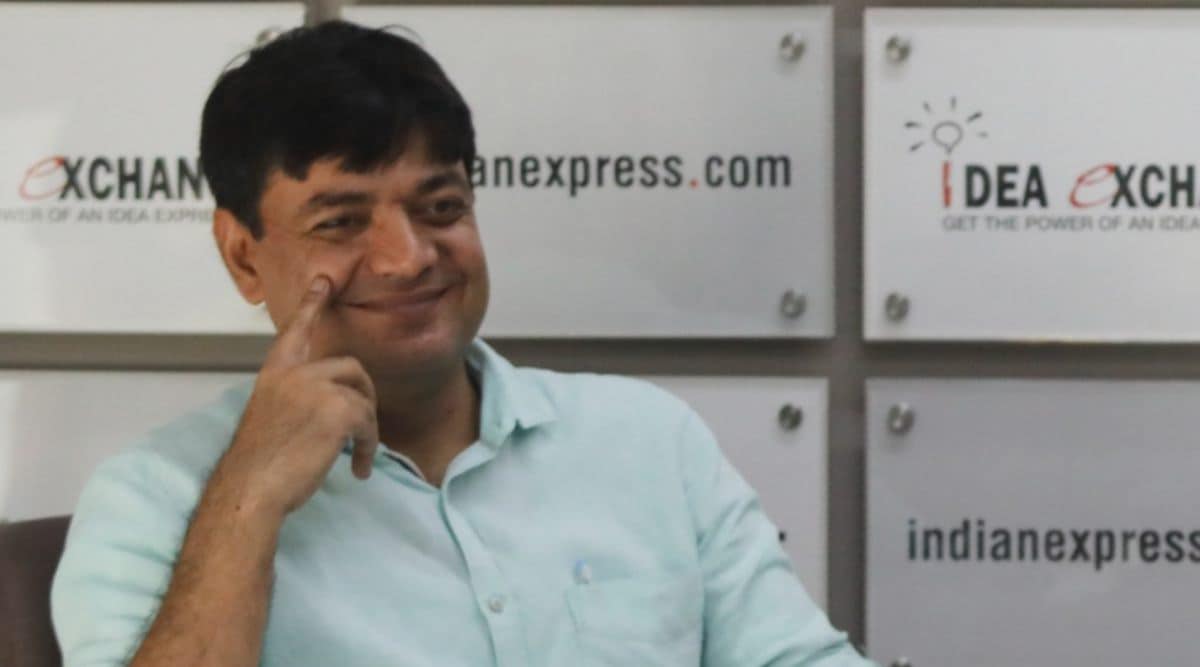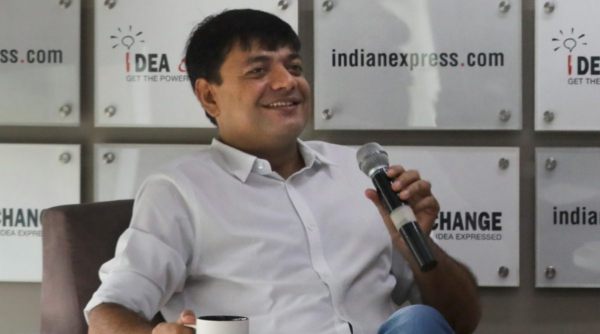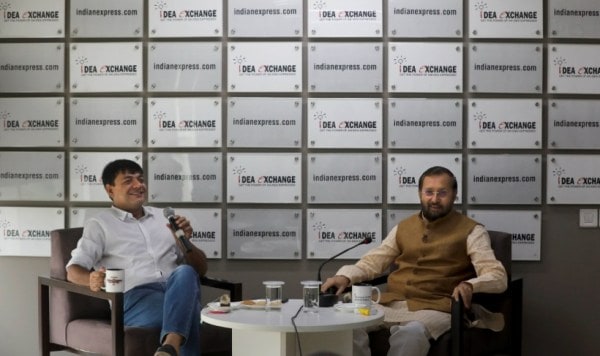 Ravish Tiwari, National Political Editor and Chief of National Bureau of The Indian Express.
Ravish Tiwari, National Political Editor and Chief of National Bureau of The Indian Express. Ravish was not just a colleague, not a boss, not a friend, he was a brother to me.
Let me start from the beginning.
Ravish walked into The Indian Express newsroom in September 2006 to become part of the political bureau. I had just started covering the Education Ministry (then the Human Resource Development Ministry, under Arjun Singh). We were introduced, and I learnt he was a Rhodes Scholar, having gone there after graduation from IIT Bombay, and had done his Master’s dissertation from Oxford University on the topic “Social Justice in Secondary Education in India: State-wise Comparison (2005-06)”.
He gave me a crash course on the pattern of participation and access to secondary education for the marginalised. I still remember being blown away by his deep understanding of the sector, and his insight. Where he came from and his humble roots also made him one of the finest of his generation.
Hailing from Deoria (UP), he was among the top students of Basti district selected from over 2,000 students who appeared in a test for admission to Jawahar Navodaya Vidyalaya. He stood all-India third among all students from JNVs in Class 10 exams.
After IIT-Bombay and his Master’s from Oxford University, the story goes that the free-spirited Ravish caught hold of The Indian Express editor on the Bandra seafront and convinced him about his passion for journalism.
Ravish came on board, and there was no looking back.
At The Indian Express, he started covering rural development and agriculture, as well as the Uttar Pradesh-based political parties SP and BSP. But Ravish was a political mind, and could easily navigate and marry his political sense with academic rigour.
As a reporter, he had academic interest in the subjects he covered. I remember he read and introduced me to Prof Paul R Brass — Professor (Emeritus) of Political Science and International Studies at the University of Washington, Seattle — who had worked extensively on UP politics and had done a two-part seminal book on Charan Singh. Ravish was curious to read such works and then talk to politicians from the Hindi heartland to inform his reportage.
His humility and intellect was a unique combination, given he had access to some of the most classified information during Cabinet meetings.
 Ravish Tiwari passed away on Saturday.
Ravish Tiwari passed away on Saturday. One of my favourite stories about him, which many of us who have worked with him, is this: he would walk in a day before the Union Cabinet meeting with information on the entire Cabinet agenda, and five people in the political bureau would be filing stories on their ministry’s agenda (which was confidential), and he would have his cigarette and chai. All the stories would have his joint byline.
After working in The Indian Express for about eight years, he moved to a weekly — India Today — and his ability to anticipate stories beforehand made him a natural fit. It was a transition he was able to make seamlessly.
Over the years, he became one of the finest political reporters. Not one to brag, he was at his best in 2017, when he called the UP elections in favour of the BJP with his deep and layered understanding of the state he belonged to.
He developed into one of the finest political journalists of his generation, and could interact with the most diverse range of leaders — from Prime Minister Narendra Modi to the late LJP leader Ram Vilas Paswan, the Congress’s Jairam Ramesh to AAP’s Atishi Marlena (who was a fellow Rhodes Scholar of his batch), and senior BJP leaders Amit Shah to Raghuvansh Prasad Singh — and could always get that odd-nugget, that spicy gossip, that wonderful insight, that great tip-off.
“Yeh chatpat story hai,” he would always say, with a smile.
One of his stand-up comedy acts in the newsroom would be his mimicry of how Samajwadi Party chief Mulayam Singh Yadav spoke in his native dialect, sometimes completely unintelligible to others. It was one of the best mimicry of Mulayam our newsroom saw, as we almost rolled on the floor laughing.
After a stint in India Today and The Economic Times, he came back to The Indian Express in 2017, bringing his contacts in the political leadership and government to his new job. His leadership of the National Political Bureau team helped each reporter with some insight, information or just a probing question.
 Ravish Tiwari, National Political Editor and Chief of National Bureau of The Indian Express, during an Idea Exchange Session with Bhupesh Baghel. (Express Photo)
Ravish Tiwari, National Political Editor and Chief of National Bureau of The Indian Express, during an Idea Exchange Session with Bhupesh Baghel. (Express Photo) On almost every beat, he was always curious and would ask the most pertinent questions, making us think from a story angle one had not thought of before. “Iska visibility kya hai?”, he would ask reporters on how they saw things would play out, He was always interested in the two big questions in the modern newsroom: what next, and so what?
In August 2020 came the dreadful news. I still remember that it was the day after August 5, 2020 — the first year anniversary of the revocation of Article 370 and the day on which the foundation stone was laid for the Ram Temple in Ayodhya. That same day, he had written one of the best political analyses of the two events and how these had shaped the country’s politics.
Even while dealing with the cancer, his rational mind was to the fore. Over the last year-and-a-half, as he made the rounds of doctors and hospitals, and underwent treatment — with his very strong wife Pujya by his side — we would discuss his disease, and he would have studied it all and reasoned it in his mind. He would talk to me calmly as if he was talking of some chemical reaction: “Yaar, they are trying to give this chemical compound and that will do this to my body, and that’s how it will react”. I would just listen.
There was hardly ever any complaint about the disease. He was a fighter till the end, as he coped with the side-effects.
Almost every week or two, I would call or chat with him on WhatsApp on some story idea or something else, and he was always on top of his game.
In fact, when I was stuck in Kabul in August last year as the US troops pulled out and the Taliban took over, apart from The Indian Express editors and family, he was the one constantly checking on me and we had several conversations through that fateful day till I got out. After I came back, his childlike curiosity made me recount my entire experience in detail, much more than I could write in the paper.
My last meeting with him was two Saturdays ago. I went to his home in Gurgaon and we sat for about four hours, and chatted about politics, life and other things.
 Ravish Tewari with Rajya Sabha MP Prakash Javadekar at The Indian Express Idea Exchange.
Ravish Tewari with Rajya Sabha MP Prakash Javadekar at The Indian Express Idea Exchange. He was prepared for what was coming: “Bhagwan ne meri chit utha lee hai… Ab kab pharega, uspe depend karta hai (God had picked the chit from the box with my name on it, and it’s up to Him now to tear it)”.
Ravish was hopeful that the second round of chemo would help, but he was very clear that if it didn’t, what would that mean for him. “I have understood one thing: at this stage, the doctor’s metric is survivability,” he said.
We didn’t mention the C-word even once during the conversation. He said Pujya would get angry whenever he broached the subject of survivability with the doctors.
Read Ravish Tiwari’s reportage here
I asked him what he was watching on Netflix. He said he had started watching B R Chopra’s Mahabharata of the ’80s era. And, he quoted a deeply philosophical line from Mahabharata where one of the characters tells Dronacharya, “Ichha mrityu tumhare haath mein hai, ichha jiwan tumhare haath mein nahin hai (How you die is in your hands, but how you live is not in yours).” Explaining that Dronacharya had to deal with the deeds of Kauravas and Duryodhan, he smiled and told me how Rahi Masoom Raza had written those dialogues beautifully, and he found a deep connection with that series.
It was a good day for him that Saturday, as we sat on his balcony in the sun, and he said how he missed the newsroom but had a tough time sitting for long hours, so couldn’t attend meetings even if he wanted.
His empathy showed as he even had health advice for me, someone a few years older to him: “Please listen to your body rhythm and cycle. If anything goes wrong, or is off, just consult a specialist. Don’t delay.”
I couldn’t take anything for him, but Pujya — the brave, compassionate and calm person that she is — gave a book for my daughter. Later that night, I listened to what would be his last podcast — a masterclass on UP politics.
After I got back, I sent a book to him. As I knew he was not much of a fiction fan, it was a spy history book: Ben Macintyre’s The Spy and The Traitor. It was about a KGB spy who flips over to MI6, and gives crucial intelligence to the West in the last days of the Soviet Union.
He was so happy to get it, and he messaged a picture of him — his last picture to me — with the book. The message read: “Wow! This has real pictures as well! Excited to get this started! Thank you.”
Ravish, the deeply humble, free-spirited, intellectually curious man, my brother, has left a void in our lives.
On March 10 result day, I am sure he will watch us from above while he does his own political analysis. At 40, he has gone too soon. Will miss you, brother.
- The Indian Express website has been rated GREEN for its credibility and trustworthiness by Newsguard, a global service that rates news sources for their journalistic standards.

